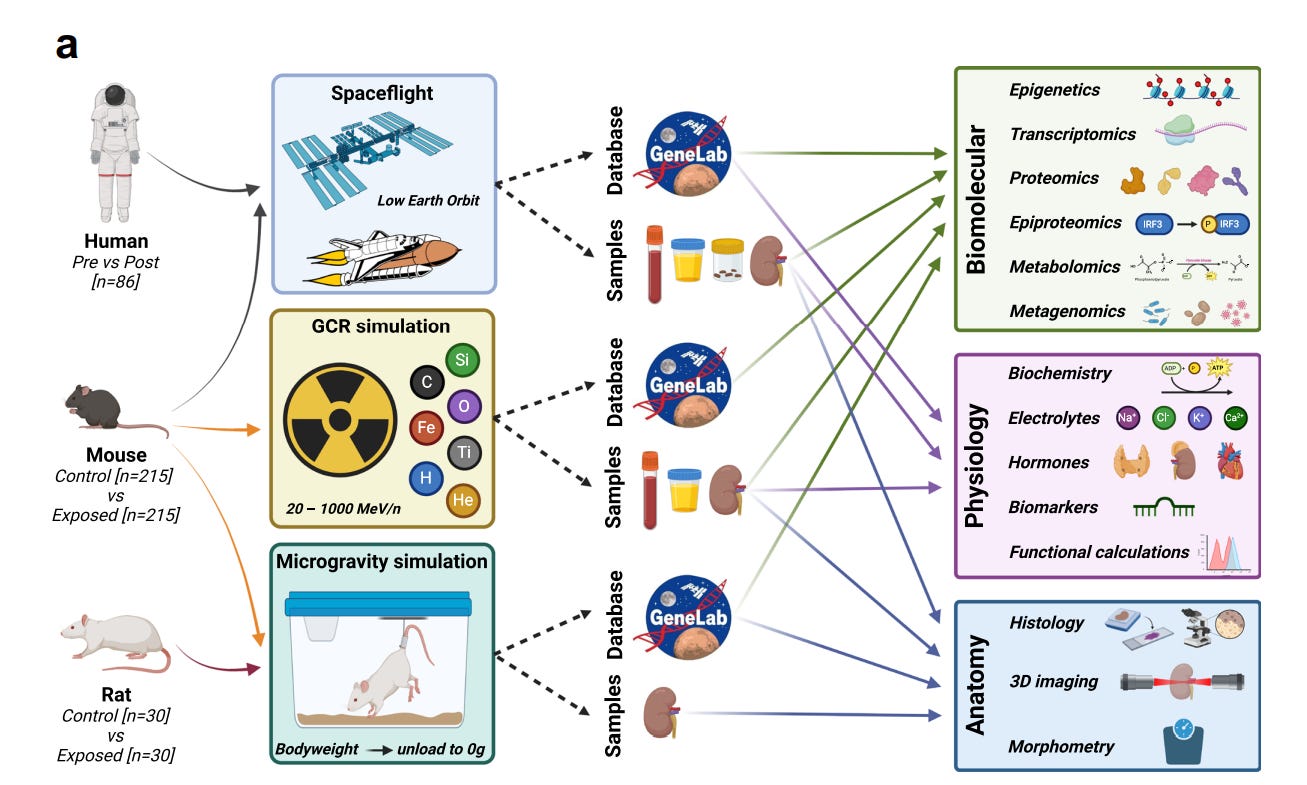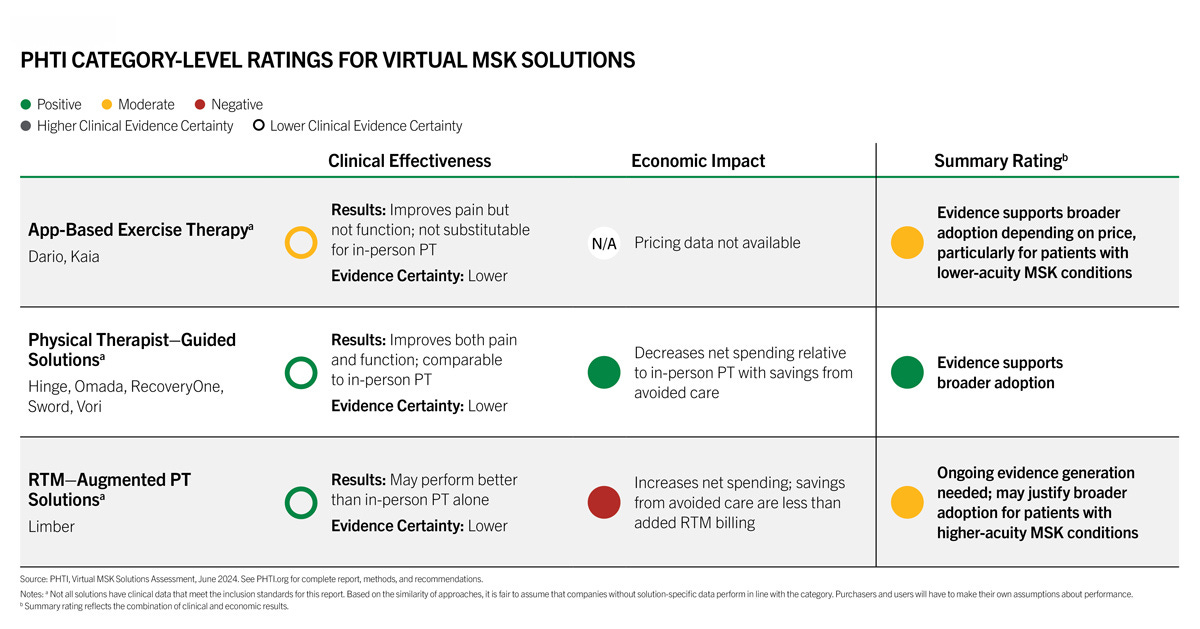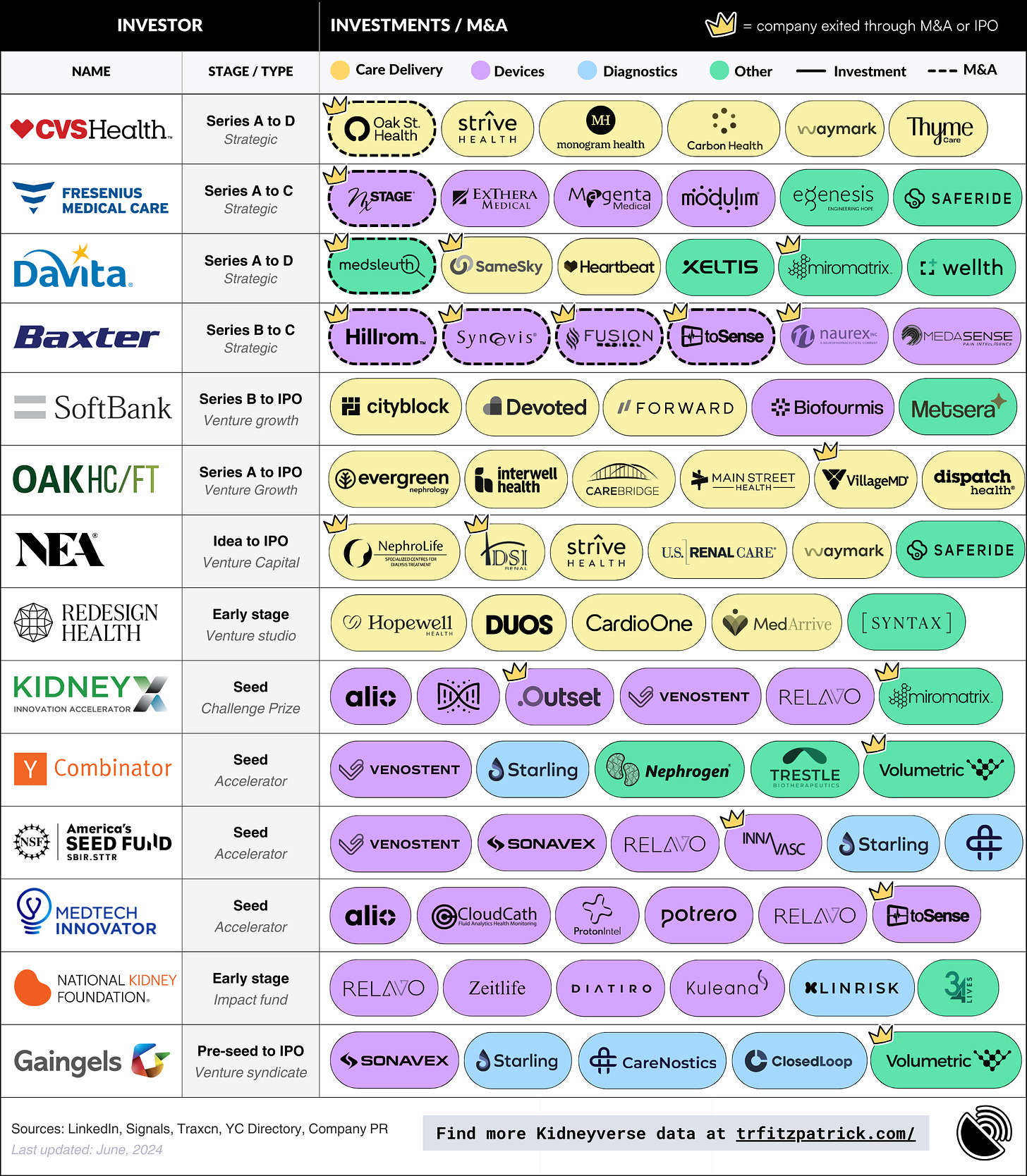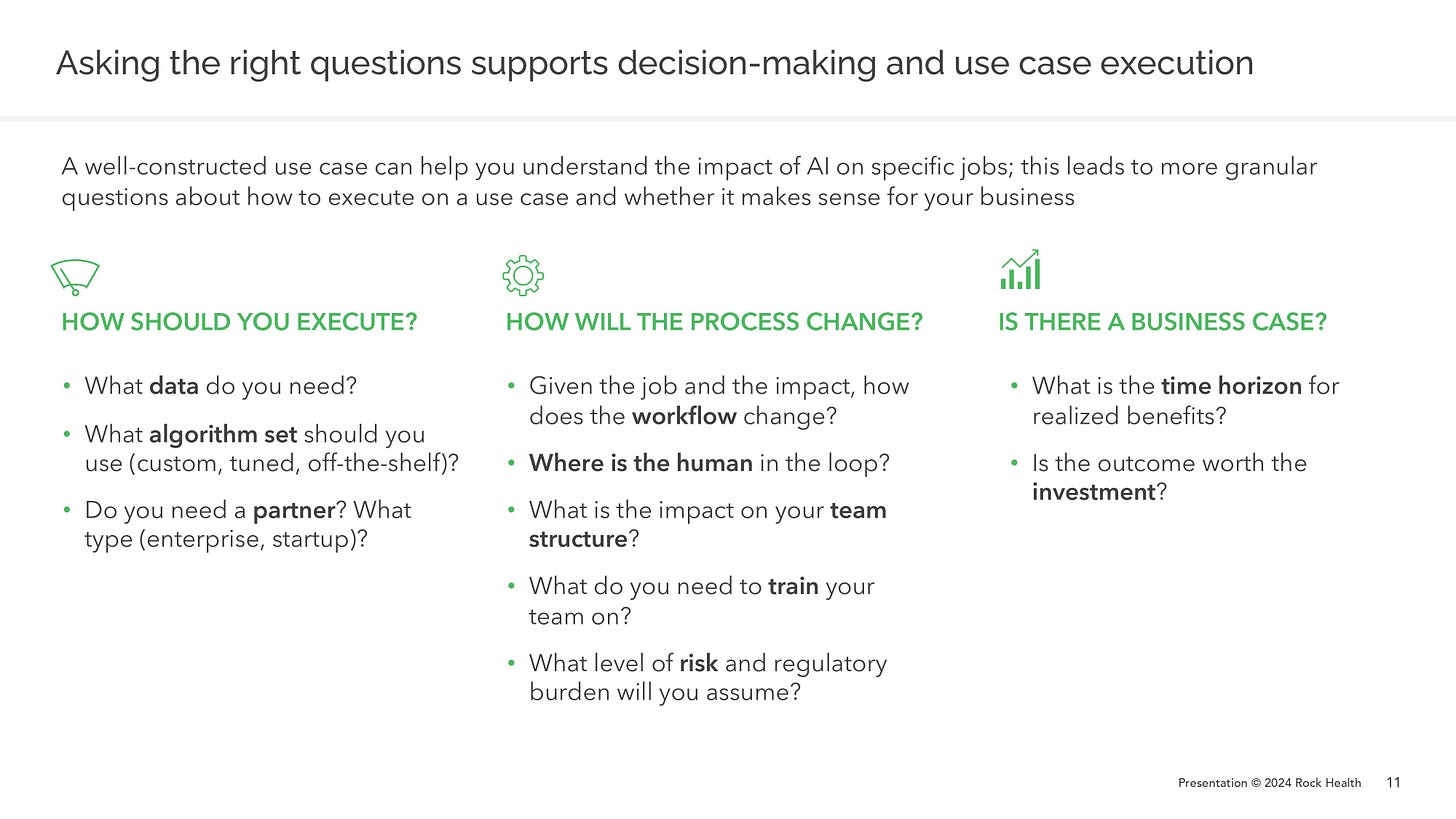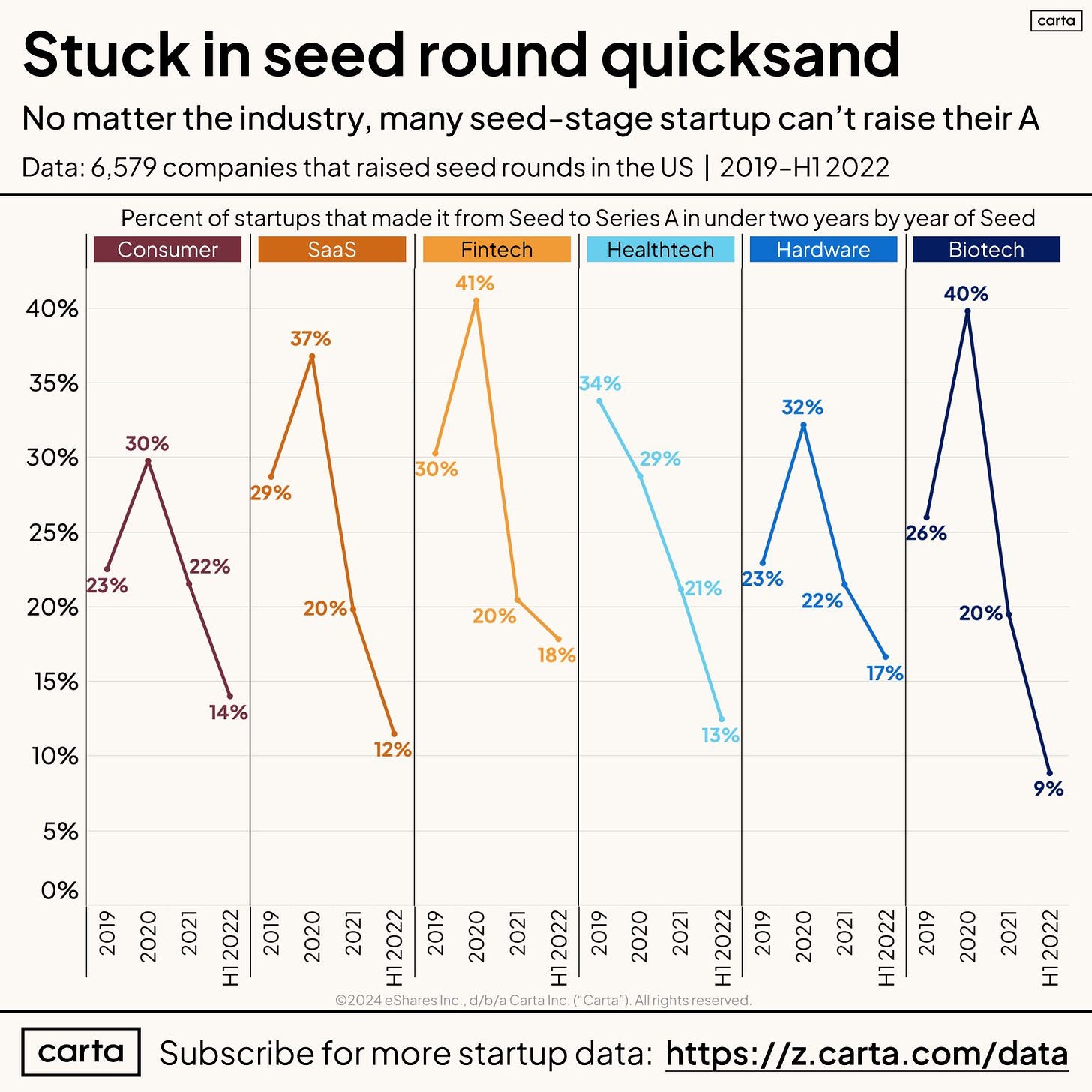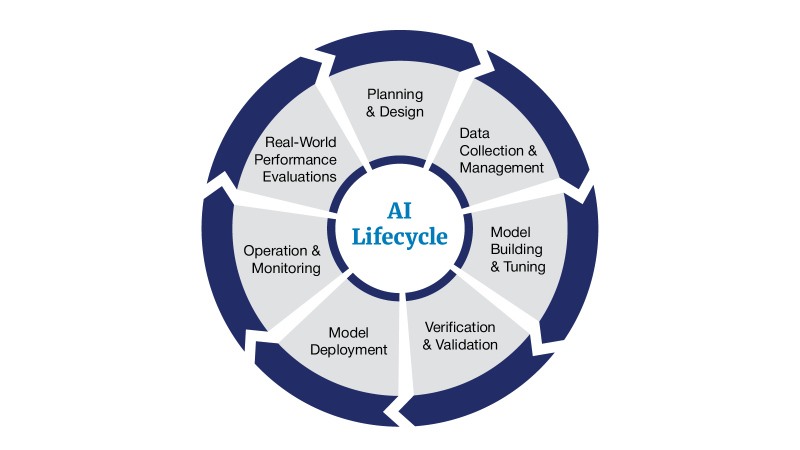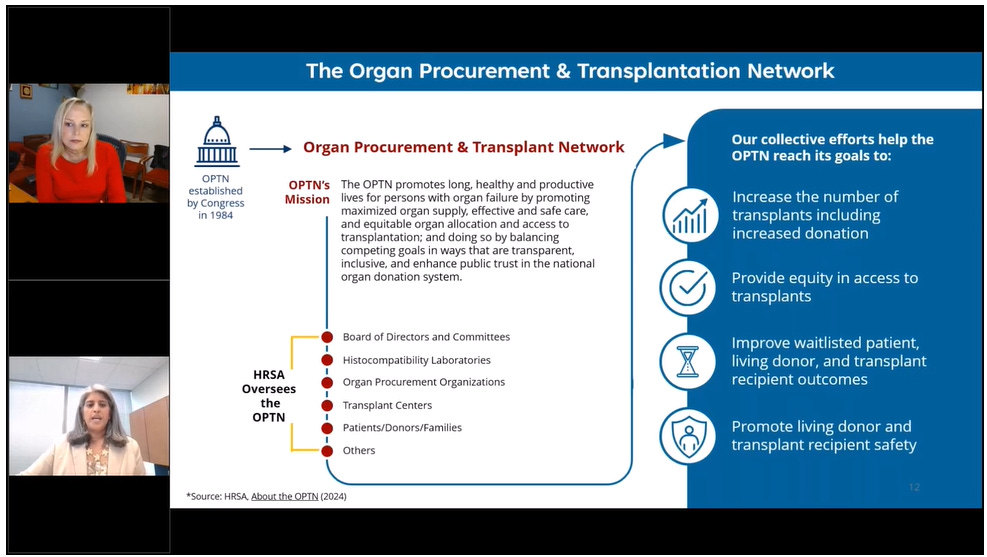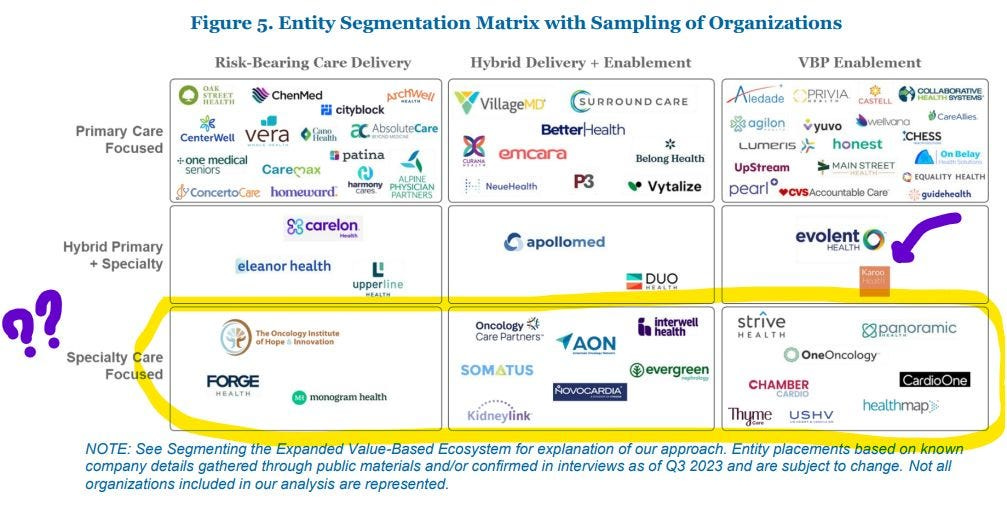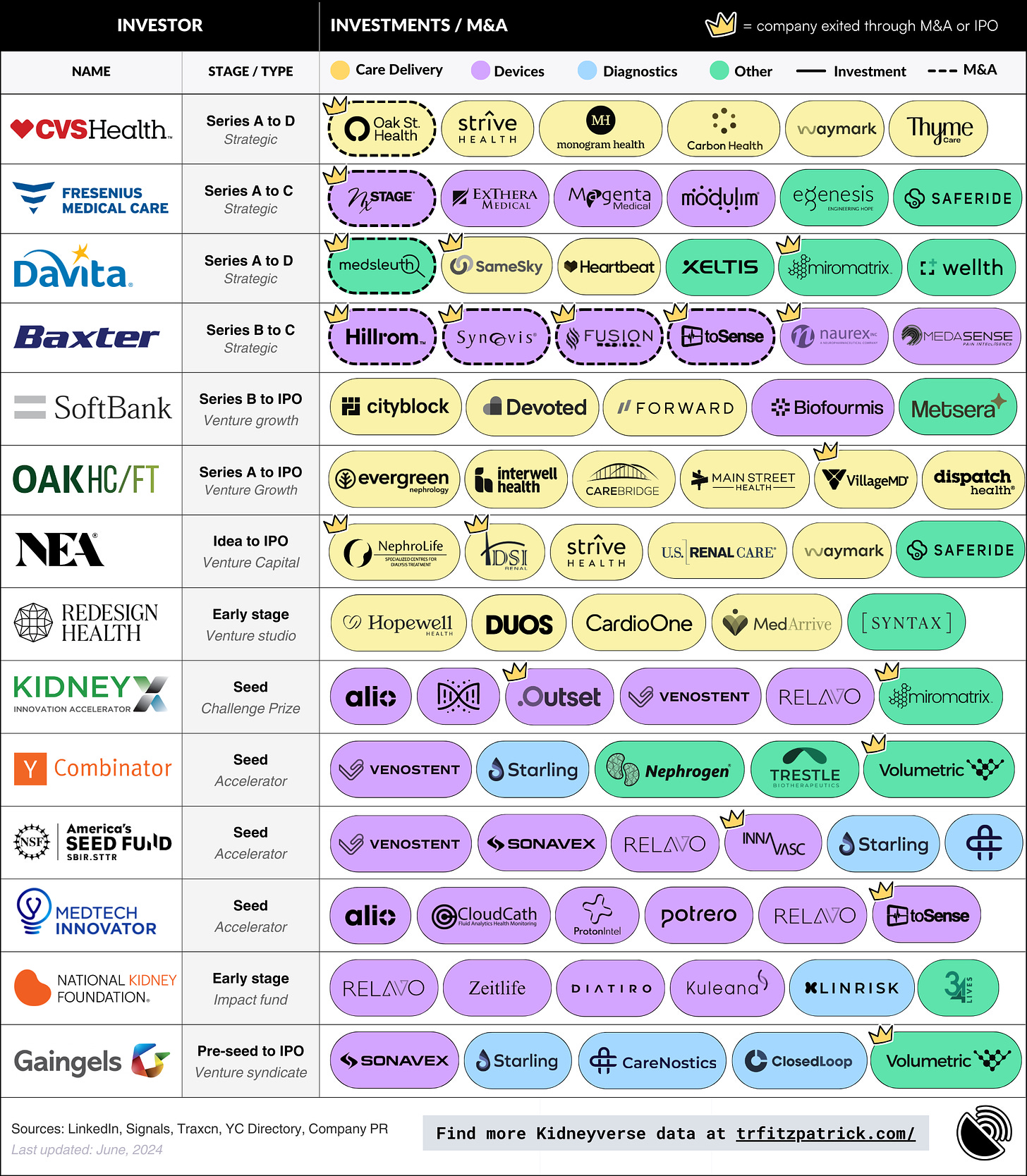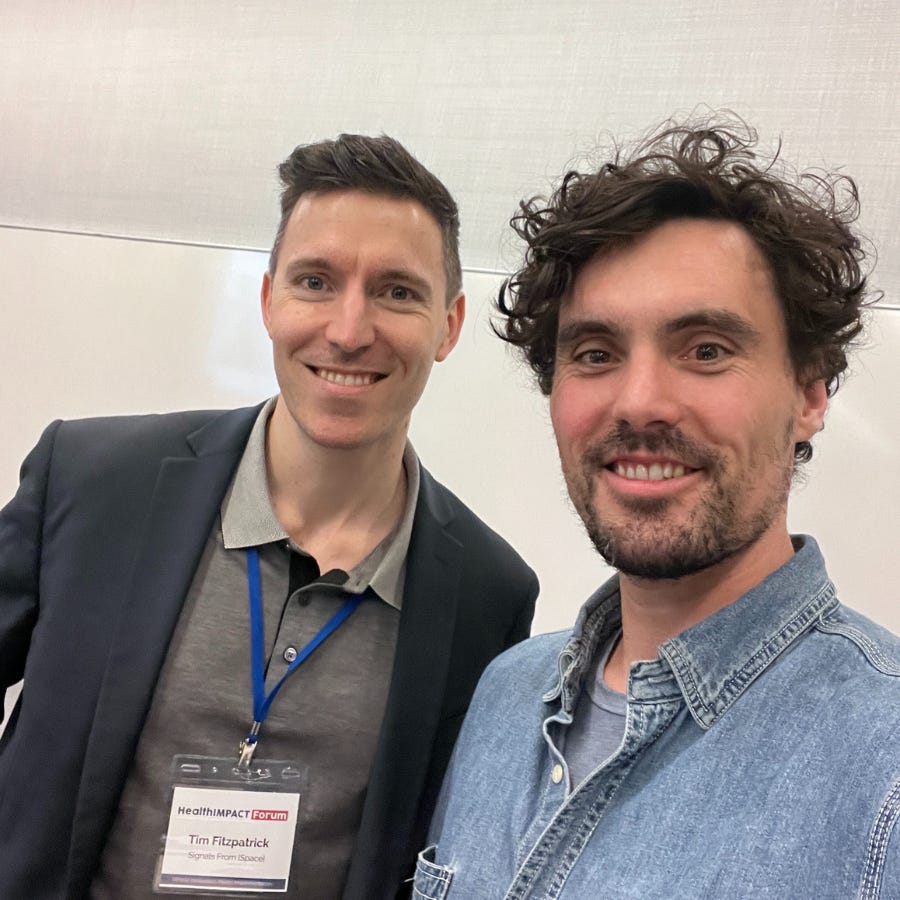Across the Kidneyverse: June 21, 2024
Cosmic Kidney Health, Medicare Advantage, Transplant Wins and the Signals Roadshow!
Welcome back to Across the Kidneyverse, our monthly exploration of headlines, market movers, research and commentary from the past four weeks of kidney innovation. This month, we’re living up to our name with groundbreaking research on how spaceflight affects kidney health, a deep dive into an eye-opening analysis of Medicare Advantage plans, landmark data in transplantation, and highlights from the buzzy conference circuit.
Have tips or feedback? Hit reply or join the conversation here.
Reading time: 30 minutes
Reminders
Kidneyverse Careers is the only place dedicated to bringing top talent + companies together across kidney care. We started sharing a few open roles per month at the bottom of this newsletter. Reach out if you want to highlight your company’s roles!📣
If you like these monthly recaps, chances are you’ll love our subscriber-only content and data. These monthly updates are a mile wide and an inch deep. The subscriber content is the opposite. We have a lot more of it coming (videos, interviews, data, deep dives, etc.). We know a lot of you use Signals to make decisions at work, which is why we put together this draft email template you can use to ask your manager to expense a paid subscription.
The Signals Inbox is always open to anyone who wants to share news, tips, and updates that belong in this monthly recap. It’s anonymous, so let me know what you’re seeing and hearing out there that people should know about!
Contents
Headlines
A Closer Look
Visual of the Month
Events & Meetups
Kidney Careers
Headlines
Here’s what caught my eye across the Kidneyverse this month, organized by topic.
Discovery & Innovation
Market Insight
Policy & Regulation
Community Voices
Discovery & Innovation
Covering the latest in research, development, and breakthroughs.
A landmark study published in Nature Medicine validates CareDx's AlloView, an AI-enabled risk prediction model, and demonstrates that AlloSure Kidney can detect subclinical rejection in clinically stable kidney transplant patients. The international multicenter study of 2,882 patients highlights that AlloSure donor-derived cell-free DNA (dd-cfDNA) levels rise before biopsy-proven rejection and decline with immunosuppression treatment, suggesting their potential in rejection monitoring and treatment response.
BMI OrganBank announced promising preclinical data for its OrganBank Transport device, which successfully preserved kidneys for 24 hours using a warm perfusion system without blood. This innovation could increase the viability of kidneys from older donors and those after circulatory death (DCD), potentially reducing the waitlist for kidney transplants. The study, conducted with Duke University, demonstrated improved graft function and could pave the way for clinical studies and FDA approval.
The Surveillance HeartCare Outcomes Registry (SHORE) study demonstrates that dual molecular testing—using gene-expression profiling (GEP) and donor-derived cell-free DNA (dd-cfDNA)—improves the detection of acute cellular rejection (ACR) in heart transplant patients compared to single tests. Among 2,077 subjects, dual-positive results showed a higher incidence of ACR and led to more follow-up biopsies, but overall biopsy rates declined over time. The study indicates better surveillance accuracy and suggests dual testing could reduce biopsy frequency while maintaining high survival rates and low graft dysfunction.
A study led by UCL’s Keith Siew, PhD, published in Nature Communications, shows that prolonged space travel can cause significant renal damage and dysfunction due to microgravity and cosmic radiation. The analysis, which included data from over 40 space missions and multiple space simulations, found that parts of the kidneys can shrink in less than a month in space. While this does not rule out future Mars missions, protecting astronauts' kidney health will be crucial.
A recent analysis published in JAMA reveals that Medicare Advantage (MA) plans have led to $82 billion in taxpayer overpayments in 2023 and $612 billion from 2007 to 2024. These overpayments are driven by diagnosis upcoding and favorable selection strategies used by insurers. Despite lower spending on medical services, MA's restrictive managed-care techniques often reduce both high-value and low-value care, raising concerns about the program's efficiency and impact on patient outcomes.
“Celebrating a Medicare Advantage (MA) milestone— enrollment in those private plans surpassed 30million— the health insurance industry’s trade group proclaimed MA ‘a good deal for members and taxpayers.’ The first part of that claim is debatable, while the second part is false.” — JAMA
Promising news from the Alzheimer’s front. For the first time, a RCT has demonstrated that an intensive lifestyle intervention — without drugs — may significantly improve cognition and function in many patients with mild cognitive impairment or early dementia due to Alzheimer’s disease. The 20-week intervention included changes to diet, exercise, stress management, and group support. (H/t to Marc Sluijs for flagging this one)
Researchers from the Institute for Bioengineering of Catalonia (IBEC) have successfully generated kidney organoids with a complex vascular system by combining kidney and endothelial organoids. This advancement mimics human kidney vasculature, offering new possibilities for disease modeling and drug testing. The study, published in Advanced Materials, could lead to improved methods for organoid transplantation and the study of vascular-related kidney diseases.
Market Insight
Trends, funding updates, and industry developments.
Two weeks ago, we (finally) had our first digital health IPO since 2022 in Waystar, followed by Tempus AI last week. Does this open the flood gates; and, if so, who’s next? Brock Turner’s latest piece in Modern Healthcare takes a look at 6 IPO prospects in Ro, Noom, Hinge Health, Omada, Sword, and Headspace.
Humana just published a 10-page report on its value-based kidney care programs for more than 77,000 patients across the country. The report includes outcomes across its partnerships with Evergreen Nephrology, Interwell Health, Monogram Health and Strive Health, along with dialysis providers DaVita IKC and Fresenius.
ProKidney just announced the pricing of its upsized $130 million public offering to support the continued development of rilparencel, its Phase 3 candidate being evaluated to potentially preserve kidney function in diabetic patients at high risk of kidney failure. Rilparencel (also known as REACT®) has received Regenerative Medicine Advanced Therapy (RMAT) designation, as well as FDA and EMA guidance.
Akili just announced FDA clearance of EndeavorOTC (AKL-T01) as an over-the-counter treatment for adults with attention-deficit/hyperactivity disorder (ADHD). This is the first and only digital therapeutic cleared by FDA as an over-the-counter treatment for adults with ADHD. Three weeks ago, Akili also announced it will sell for $34 million and merge with Virtual Therapeutics to create a larger digital health entity.
Peterson Health Technology Institute (PHTI) released its latest report on virtual musculoskeletal (MSK) solutions. The topline: virtual MSK solutions improve health outcomes and lower costs, providing an effective treatment option to expand physical therapy access for patients. And the solutions that involve physical therapists throughout the process are shown to improve patients’ pain and function comparable to in-person PT while reducing healthcare spending. (H/t Meg Barron for sharing)
Renesan + Visonex are now Renvio. The rebranded company will continue to offer a comprehensive suite of technology solutions tailored for the dialysis industry, including electronic medical records (EMR) software, billing software and services, scheduling and patient engagement solutions, dialysis management services, and advanced analytics.
Panoramic Health just appointed Dr. Navdeep Tangri as Senior Advisor for Panoramic Science. Dr. Tangri’s work contributed to the development of the Kidney Failure Risk Equation (KFRE). Panoramic Science is the clinical research division of Panoramic, which offers a turnkey solution for executing Phase 2-4 regulated clinical trials for medications and devices awaiting FDA approval.
Last week on Signals we sent out an updated table of the 14 Most Active Investors in Kidney Care from Idea to IPO — adding NEA, Softbank, and Redesign Health to the mix. If you have insights, tips, or takeaways to share on the current funding climate and what we should expect to see in this portfolio over the next 12 to 24 months, please hit reply or send me an anonymous note.
“What does it take in this landscape to build strong relationships with health system partners?” Hospitals have been wrestling with inflation, labor and drug shortages, and have been tough customers for startups selling into the space. Initialized Capital’s Parul Singh recently assembled a group of health system leaders to answer this very question— here are their 5 key takeaways.
“With all the noise around AI’s potential, it can be hard to identify the concrete ways AI could improve jobs-to-be-done at your organization and determine if there’s a business case for implementation.” So, you’ve built an AI use case for healthcare— but are you asking the right questions? The team at Rock Health recently held a webinar titled From buzzword to business case: Unlocking AI's potential in pharma based on its February report. The image below came directly from the webinar presentation — slides are available here.
In healthcare and medtech, insider rounds and valuation resets are the name of the game, and have been since last year. Jonathan Norris (Managing Director of HSBC Innovation Banking) led a fascinating panel on the challenges of building and financing medtech ventures at the LSI USA ‘24 event in Dana Point in March. I was lucky enough to be in the audience for this one, and now you’re the lucky one! The video of this panel just went live on the LSI site. Believe me, this is a must watch if you’re a founder, operator, or investor in this space.
In the medical device sector, there is a noticeable trend where series B and later stages are experiencing valuation resets. After the high valuations seen in 2021, new investor-led deals are now seeing this correction. — LSI Panel Insights
“No matter the industry, no matter the location in the US, the percentage of startups that have made it from their Seed to their Series A in under 2 years has fallen every year since 2020.” Recent Carta data shows us why it’s hard out there for startups to raise their Series A these days. Take a look at the last three columns in the graphic below— the percent of startups that made it from Seed to Series A in under two years has fallen off a cliff in healthtech, hardware, and biotech.
Policy & Regulation
Updates on policies, regulations, and government initiatives.
Remember the FDA’s Home as a Health Care Hub initiative we wrote about in April? Well, two quick updates to share. First, the initiative now has its own website where you can learn more, ask questions, and track events. Speaking of which, the second update is about the virtual public meeting to be held on July 25 from 12pm to 4pm ET. Register for the event here. (H/t to Melissa West for flagging this one)
Less than a week after the FDA published best practices for transparency in machine learning-enabled medical devices, the agency outlined priorities for the development and quality assurance of AI models in medical devices. In his blog post on Monday, DHCoE Director Troy Tazbaz said his team wants to foster responsible AI innovations in health care while ensuring these technologies, when intended for use as medical devices, are safe and effective for the end-users, including patients.
HRSA recently held a town hall to address OPTN Board Separation and future Governance with Dr. Suma Nair, Director, Office of Quality Improvement, Bureau of Primary Health Care/HRSA and Dianne LaPointe Rudow, Chair of the OPTN Board of Directors. Learn more and watch the full virtual town hall here. (H/t to Tenaya Wallace for flagging).
Community Voices
Commentary, opinions, and events across the kidney care community.
Calling all readers in Buffalo! This weekend at Buffalo's Outer Harbor, the Walk for Kidney Health will raise awareness of kidney disease.
A recent Roundtable on Data-Driven Health Equity Strategies, convened by Health Evolution, brought together Kelli Tice, MD, VP of Medical Affairs and Chief Health Equity Officer at GuideWell & Florida Blue; Mark Gwynne, DO, President of UNC Health Alliance; and Mike Uchrin, CEO & Co-Founder at Monogram Health. Read their shared insights here.
How do you feel about value-based care (VBC) dashboards? Do you like (or even trust) them? Dr. Yubin Park shared a great LinkedIn post this week ahead of his upcoming talk with Project ECHO. Specifically, I like his breakdown of three types of VBC dashboards, how they’re used, and how data recency impacts their use (see images below).
Operational: monitors current operational status and provides prescriptive / detailed guidance to improve performance.
Strategic: tracks key performance indicators (KPIs) to evaluate the current strategic direction and long-term plans.
Analytical: allows deep drill-down of various data elements to investigate specific issues and develop new hypotheses.
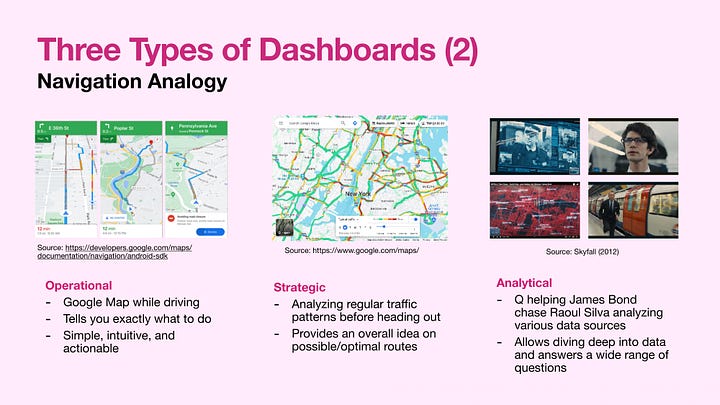

Dr. Vega Shah works on NVIDIA’s Healthcare and Life Sciences AI team. She recently wrote a short substack post titled Let there be drugs about FDA trends from last year’s record year (71 new therapeutics — double 2022 numbers). The post covers the continued rise of biologics, favor to orphans over big diseases, and FDA efforts to better regulate AI/ML use in drug R&D.
Kidney Research UK participated in the UK Kidney Week held at the Edinburgh International Conference Centre last week. The team engaged with the kidney community, presented research, and highlighted the importance of mental health in kidney patients. Key discussions included health inequalities in CKD and new research grants. (H/t to team members Katherine and Tracey!)
Will Flanary — aka “Dr. Glaucomflecken” — is a national treasure. He combines candor, clarity, and comedy in a way that makes even the most complex topics in medicine seem accessible and fun. One of his latest video shorts shows us why it’s a bit strange that doctors are not taught about the US healthcare system. (H/t to Tom Mueller for sharing this one).
While you’re still laughing (crying?) about the US healthcare system, you might also enjoy this short video clip from a recent episode of South Park that shows us what reimbursement for GLP-1s might look like inside the insurance labyrinth.
It feels like Halle Tecco has a habit of making appearances in my monthly recaps. Last month, it was for her post on private equity. This month, it’s because of a LinkedIn post that struck a nerve for healthcare innovation types out there, myself included. So, what’s it going to be— are you a doer, or a critic?
In this week’s Signals Poll I asked “if you had 10 years and $10 million to spend solving one challenge of your choice in kidney care— how would you spend it?”
A Closer Look
Here’s a closer look at a few headlines from above and why they matter:
1. Humana's Value-Based Kidney Care Report
Humana recently published a comprehensive report detailing the outcomes of its value-based kidney care (VBC) programs, which impact over 77,000 patients across the United States. The report highlights successful partnerships with specialty VBC providers such as Evergreen Nephrology, Interwell Health, Monogram Health, and Strive Health, as well as large dialysis providers DaVita and Fresenius.
Why it Matters: These VBC partnerships have demonstrated significant improvements in patient outcomes and cost savings. For example, the report notes a 5% reduction in unnecessary hospital admissions among Humana's Medicare Advantage patients in VBC programs and a reduction in the Medical Expense Ratio from over 100% to 88% over five years. This underscores the potential of value-based models to enhance the quality of care while aligning financial incentives with positive health outcomes. It takes time, even in the best drawn-up and executed arrangements.

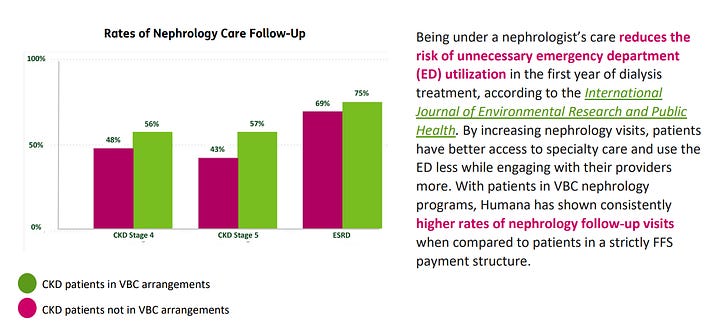

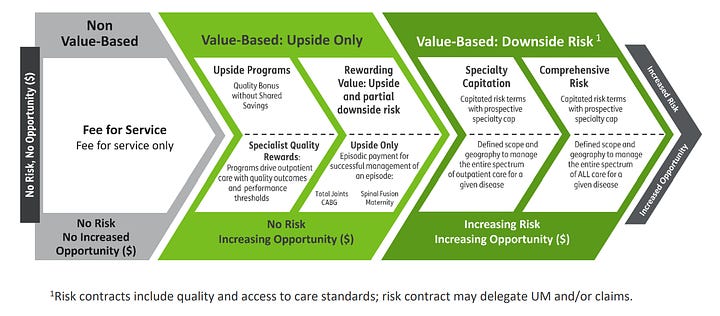
2. How M&A is Reshaping SDoH and Value-Based Cardiology Care
Recent mergers and acquisitions (M&A) highlight the interconnected nature of chronic disease management and the potential for integrated care models. GroundGame Health's merger with SameSky Health aims to address social and care needs at scale, enhancing health equity through combined expertise in social impact and member engagement. Meanwhile, Karoo Health's partnership with Heartbeat Health seeks to establish a national value-based care solution for cardiovascular disease, leveraging AI-powered technology and virtual cardiac services to improve patient outcomes and reduce costs.
Why it Matters: These partnerships underscore the necessity of holistic, integrated approaches in chronic disease management, particularly for patients with kidney disease who often face comorbid conditions like heart disease. By addressing social determinants of health and enhancing value-based care models, these collaborations aim to provide more comprehensive and effective care, ultimately improving patient outcomes and reducing healthcare costs.
Visuals of the Month
Pictures say a thousand words. What does this Kidney Capital table of 14 of the most active investors in kidney care tell us about the future of our Kidneyverse?
Events & Meetups
ATC 2024 (American Transplant Congress)
The American Transplant Congress 2024 in Philadelphia brought together leading experts in transplant medicine. I had the opportunity to speak with scientists, clinicians, policymakers, startups and industry leaders about innovative therapies in kidney transplantation. One atom, bit, and genome at a time, we’re getting closer to answering the question at hand: "If you could build a transplant-focused journey for people with kidney disease, what would it look like?"


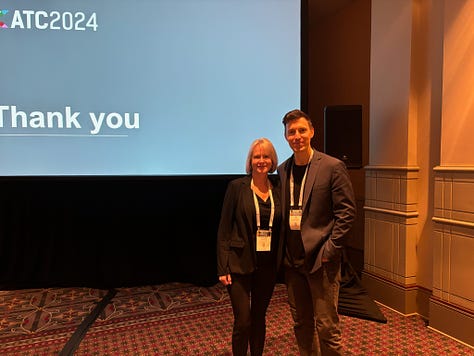
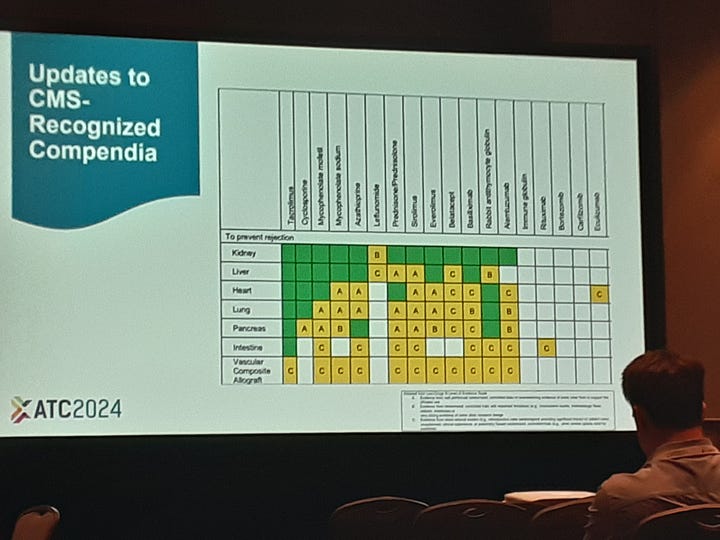
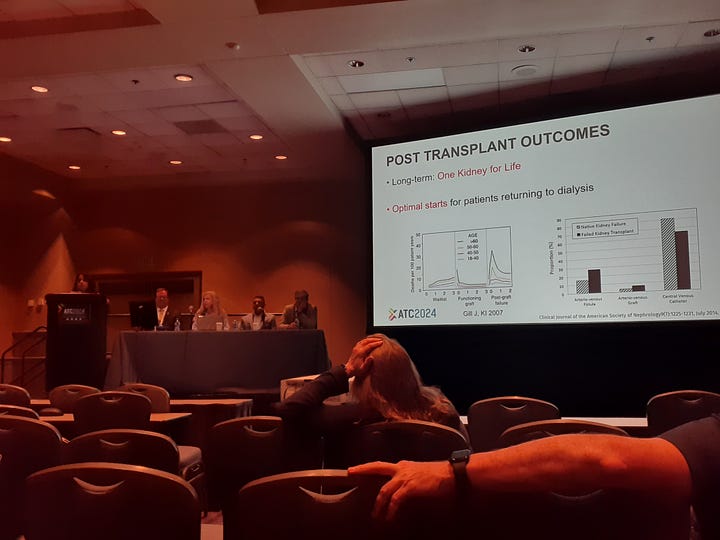
KHI Innovation Meeting
The KHI Kidney Innovation Conference in Washington, D.C., focused on fostering collaboration between researchers, industry, and patients to advance kidney care. I had a chance to share the stage with Uptal Patel, Janis Naeve, and Paul Grill to close out the meeting with our panel about funding gaps in kidney innovation from idea to IPO. “If you were building or advising a company bringing a new solution to market in kidney care today, how would you fund it?”


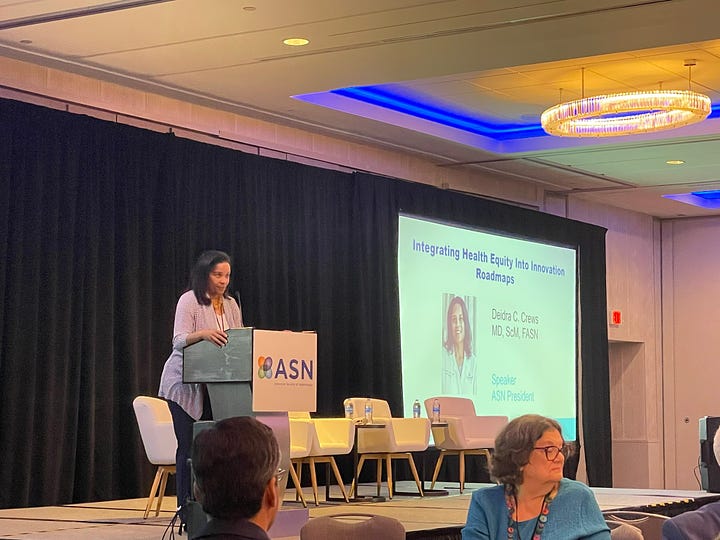

HealthIMPACT Forum
At the HealthIMPACT Forum in New York, the discussions centered around the future of digital health and its impact on patient care. While most meetings and conferences focus heavily on barriers to innovation, this one centered on implementation. We heard from dozens of health system and industry leaders like Drs. Sachin Jain (SCAN), Tina Shah (Abridge), and Shelly Nash (Fresenius) on issues from equity to AI, and connectivity to culture.
Kidney Careers
Here’s a list of high priority open roles across the Kidneyverse. Send me a message if you want to get in touch with these companies and hiring teams.
Renvio — Clinical Education Specialist: The Clinical Education Specialist is a bridge between the healthcare industry, Visonex, and the clients. This role requires extensive industry knowledge, including clinical practices and workflows.
AstraZeneca — Global Medical Head (Cardiovascular): As the Global Medical Head, CV, you will shape product and disease area strategy, build our capability, drive product launches and life cycle management, provide strategic direction for evidence generation, education and publication, and engage extensively externally to further the scientific leadership of AZ.
Balboa Nephrology — Chief Operations Officer (COO): The COO is the business leader of the three primary companies of Balboa. They share P&L responsibilities for the businesses with the President and CFO. You will be the accountable leader for all Balboa United staff in the operations lanes.
Over and out
That’s all for this month. Thank you for being here. Please know how grateful I am for your work, interests, passions, and support for this labor of love.
As always, let us know what’s on your mind, who we should know, and what we should explore next.
— Tim
![Signals From [Space]](https://substackcdn.com/image/fetch/w_80,h_80,c_fill,f_auto,q_auto:good,fl_progressive:steep,g_auto/https%3A%2F%2Fsubstack-post-media.s3.amazonaws.com%2Fpublic%2Fimages%2F55686857-6b99-45a6-ac0f-09c9f023f2a0_500x500.png)
![Signals From [Space]](https://substackcdn.com/image/fetch/e_trim:10:white/e_trim:10:transparent/h_72,c_limit,f_auto,q_auto:good,fl_progressive:steep/https%3A%2F%2Fsubstack-post-media.s3.amazonaws.com%2Fpublic%2Fimages%2F4d588ac1-7fac-4bd4-829d-fc7b4e8f1326_1512x288.png)

![Signals From [Space]](https://substackcdn.com/image/fetch/w_36,h_36,c_fill,f_auto,q_auto:good,fl_progressive:steep,g_auto/https%3A%2F%2Fsubstack-post-media.s3.amazonaws.com%2Fpublic%2Fimages%2F55686857-6b99-45a6-ac0f-09c9f023f2a0_500x500.png)


